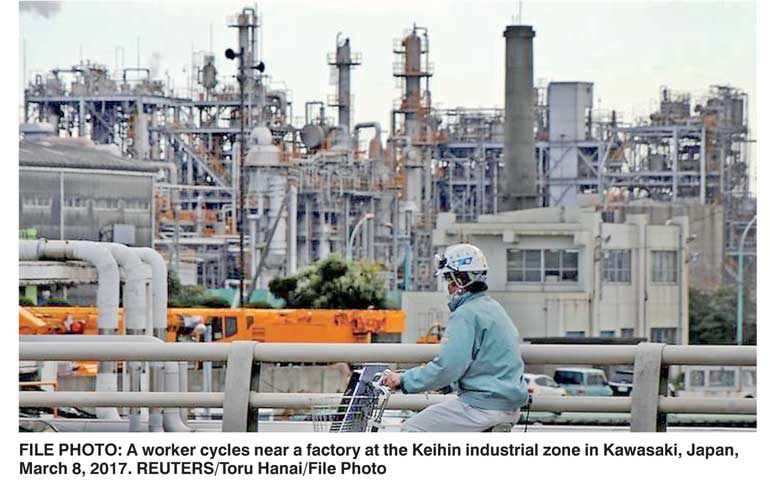Tuesday Feb 17, 2026
Tuesday Feb 17, 2026
Wednesday, 1 November 2017 00:37 - - {{hitsCtrl.values.hits}}
 TOKYO (Reuters): Japan’s industrial output fell less than expected in September and companies expect output to rise in October – keeping the economy on an expansion path.
TOKYO (Reuters): Japan’s industrial output fell less than expected in September and companies expect output to rise in October – keeping the economy on an expansion path.
Labour demand remained at the strongest level in 43 years, but household spending unexpectedly fell in September, raising some concern about the lack of impact a tight jobs market had on consumer spending.
The Bank of Japan is expected to signal at a policy meeting ending on Tuesday that it will hold off on expanding stimulus for the time being, but it may still struggle to explain why economic growth is not pushing up consumer prices.
“Industrial output fell due to temporary weakness in China’s economy, but global demand remains solid, so output will rise in the future,” said Daiju Aoki, regional chief investment officer for Japan at UBS Securities.
“Consumer spending looks a little weak. It’s important for the BOJ to see a recovery in consumption. Unless this happens, the BOJ could lower its growth forecasts in the future.”
Industrial output fell 1.1% in September because of a fall in output of memory chips, equipment to make flat panel displays, and heavy machinery used in construction, trade ministry data showed on Tuesday.
The fall was the largest in four months but still less than the median estimate for a 1.5% decline.
Manufacturers surveyed by the trade ministry expect output to rise 4.7% in October and fall 0.9% in November.
Japan’s jobless rate held steady at 2.8% in September, data from the Internal Affairs Ministry showed, matching the median estimate.
The jobs-to-applicants ratio also held steady at 1.52 in September from the previous month, showing labour demand remains at the strongest in 43 years. The median estimate was for 1.53.
Household spending fell 0.3% in September from a year earlier in price-adjusted real terms, compared with economists’ median estimate of a 0.7% annual increase.
The decline was due to lower spending on golf, travel, air conditioners and refrigerators, the data showed.
Domestic demand was brisk in the first half of the year, but the weaker-than-expected household spending data suggests it is now losing some momentum.
Economic growth has been slow to translate into higher consumer prices, which is frustrating the BOJ’s efforts to reflate the economy.
Core consumer prices rose 0.7% in September from a year ago, well away from the BOJ’s 2% inflation target.